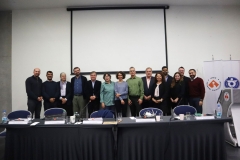
FACULTY OF BUSINESS
Department of Political Science and International Relations
PSIR 312 | Course Introduction and Application Information
| Course Name |
Turkey - EU Relations
|
|
Code
|
Semester
|
Theory
(hour/week) |
Application/Lab
(hour/week) |
Local Credits
|
ECTS
|
|
PSIR 312
|
Fall/Spring
|
3
|
0
|
3
|
6
|
| Prerequisites |
None
|
|||||
| Course Language |
English
|
|||||
| Course Type |
Elective
|
|||||
| Course Level |
First Cycle
|
|||||
| Mode of Delivery | - | |||||
| Teaching Methods and Techniques of the Course | - | |||||
| Course Coordinator | ||||||
| Course Lecturer(s) | ||||||
| Assistant(s) | ||||||
| Course Objectives | This course analyses the evolution of the EU-Turkey relations (legal, economic, geostrategic, cultural and institutional aspects). The first part of the course focuses on the preferences and power of the involved actors, the second part addresses current debates in EU-Turkey relations. |
| Learning Outcomes |
The students who succeeded in this course;
|
| Course Description | Evolution of the political, economic and legal dimensions in the historical evolution of Turkey-EU relations in a comparative perspective. |
|
|
Core Courses | |
| Major Area Courses |
X
|
|
| Supportive Courses | ||
| Media and Management Skills Courses | ||
| Transferable Skill Courses |
WEEKLY SUBJECTS AND RELATED PREPARATION STUDIES
| Week | Subjects | Related Preparation |
| 1 | Introduction | |
| 2 | Situating Turkey’s EU accession in EU studies/Reading and Presentation Skills | - -Schimmelfennig, F. and Sedelmeier, U. (2002) ‘Theorizing EU enlargement: research focus, hypotheses, and the state of research’, Journal of European Public Policy 9(4): 500-528. |
| 3 | From the Association Agreement 1963 to the Custom Union 1995 | - Aydın, Mustafa (2003) ‘The Determinants of Turkish Foreign Policy, and Turkey’s European Vocation’ The Review of International Affairs 3(2):306-331. - Kabaalioglu (1998) The Custom Union: A final step before Turkey’s Accession to the EU, 113-140 - Arıkan, H. (2003) Turkey and the EU (Ashgate): 59-69 - Hartler, Christina and Sam Laird (1999) The EU Model and Turkey. A Case for Thanksgiving, Journal of World Trade (33) 3, 147-165 - World Bank (2014) Evaluation of the EU-Turkey Customs Union, http://www.worldbank.org/content/dam/Worldbank/document/eca/turkey/tr-eu-customs-union-eng.pdf |
| 4 | Eastern Enlargement, Luxemburg 1997 and Helsinki 1999 | - -MüftülerBaç, M. and Mclaren, L. M. (2003) ‘Enlargement preferences and policymaking in the European Union: Impacts on Turkey’, European Integration 25: 17-30 - -Barnes, I. and Barnes, P. (2007) ‘Enlargement’, in Cini, M. (ed) European Union Politics (Oxford: Oxford University Press): 421-440 - -Eralp, A. ‘Turkey in the enlargement process: From Luxembourg to Helsinki’ - -Susanna Verney (2007) The dynamics of EU accession: Turkish travails in comparative perspective - -Yilmaz, Bahri (2008) The Relation of Turkey with the EU: Candidate forever?, Center for European Studies Working Paper Series, No. 167, chapter 3-4 (online) |
| 5 | From Candidate Status 1999 to the Opening of Accession Talks in 2005 | - -Akçapar, B. (2007) Turkey’s new European era (Rowman and Littlefield): 11-56. - -Schimmelfennig, Frank (2008), ‘Entrapped again: The way to EU membership negotiations with Turkey’, UCD Dublin European Institute, Working Paper 8, http://www.ucd.ie/dei/wp/WP_08-8_Schimmelfennig.pdf - -Barysch, Katinka/Everts, Steven/Grabbe, Heather (2005) Why Europe should embrace Turkey, chapter 1, 2 (and 3); http://www.cer.org.uk/pdf/p_637_europe_emb_turkey.pdf (online) - -McLaren, Lauren (2007), ‘Explaining Opposition to Turkish Membership of the EU’, European Union Politics, Vol. 8, No. 2, pp. 251 – 278 (online) - -Emerson, Michael et al. (2006), ‘Just what is this absorption capacity of the EU’, Centre for European Policy Studies, Policy Brief, No. 113. Available at: www.ceps.eu (online) - -Ruiz-Jimenez, Antonia M./Torreblanca, Jose (2008), ‘Is there a trade-off between deepening and widening? What do Europeans think?’ European Policy Institutes Network, Working Paper No. 17. Available at: www.epin.org (online) - -Ruiz-Jimenez, A and Torreblanca, J (2007). ‘European Public Opinion and Turkey’s Accession: Making Sense of Arguments For and Against’. European Policy Institutes Network Working Papers (16) (online) - -European Stability Initiative (2008), ‘A referendum on the unknown Turk? Anatomy of an Austrian debate’, Berlin – Istanbul. Available at: www.esiweb.org (online) |
| 6 | The organization and progress of the accession talks | - -Blockmans (2014) EU-Turkey Relations: Turning vicious circles into virtuos ones, CEPS Policy Brief, 26 March 2014 - -International Crisis Group (2014) Coming to terms on an imperfect reality, Europe Report 229, 14 March 2014 - -European Commission (2014) Turkey Progress Report 2014, http://ec.europa.eu/enlargement/pdf/key_documents/2014/20141008-turkey-progress-report_en.pdf - -Ministy of EU Affairs (2014a) Turkey’s New European Union Strategy, http://www.abgs.gov.tr/files/pub/turkeys_new_eu_strategy.pdf - -Ministry of EU Affairs (2014b) European Union Communication Strategy, http://www.abgs.gov.tr/files/000etkinlikler/2014/10/iletisim_stratejisi_eng_kapak_eklenmis.pdf - -European Commission: Understanding Enlargement, http://ec.europa.eu/enlargement/pdf/publication/enl-understand_en.pdf (online) - -Bürgin, Alexander (2013) A missed opportunity in Cyprus to revive talks, Hürriyet Daikly News, 8 April http://www.hurriyetdailynews.com/a-missed-opportunity-in-cyprus-to-revive-talks.aspx?pageID=238&nID=44444&NewsCatID=396 - -Ugur, M. (2010) Open-Ended Membership Prospect and Commitment Credibility: Explaining the Deadlock in EU–Turkey Accession Negotiations, Journal of Common Market Studies, 4(4): 967-991. - -Müftüler Bac (2013) The Future of Europe, Differentiated Integration and Turkey’s role, Istanbul Policy Center, October, http://www.iai.it/pdf/GTE/GTE_C_09.pdf - -Ondarza, Nicolai (2013) Strengthening the Core or Splitting Europe. Prospects and Pitfalls of a Strategy of Differentiated Europe, SWP Research Paper, March, http://www.swp-berlin.org/fileadmin/contents/products/research_papers/2013_RP02_orz.pdf |
| 7 | Europeanisation of Turkey | - -Tocci, N. (2005) ‘Europeanization in Turkey: Trigger or Anchor for Reform?’, South European Society and Politics 10(1): 7383 - -Alpan, Başak and Thomas Diez. (2014) ‘The Devil is in the ‘Domestic’? European Integration Studies and the Limits of Europeanization in Turkey’, Journal of Balkan and Near Eastern Studies 16 (1):1-10. - -Börzel, T and D. Soyaltin (2012): ‘Europeanization in Turkey: Stretching a Concept to its Limits?’ KFG Working paper No. 36, Free University Berlin, http://userpage.fu berlin.de/kfgeu/kfgwp/wpseries/WorkingPaperKFG_36.pdf - -Bürgin, A. (2014) Strategic Learning, Limited Europeanization: How the Turkish Police Used Twinning to Prepare itself for the Planned New Border Agency, Turkish Studies 15(3), 458-76 (online). - -Schimmelfennig, F. (2003) ‘Costs, Commitment and Compliance: The Impact of EU Democratic Conditionality on Latvia, Slovakia and Turkey’, Journal of Common Market Studies 41(3): 495518 (online) - -Bürgin, Alexander (2011): Why Turkey is ready for a readmission agreement, Journal of European Public Policy (online) - -Baudner, Joerg (2012): The Politics of ‘Norm Diffusion’ in Turkish European Union Accession Negotiations: Why It was Rational for an Islamist Party to be ‘Pro-European’ and a Secularist Party to be ‘Anti-European’, JCMS 2012 Volume 50. Number 6. pp. 922–938 (online) |
| 8 | Midterm Exam | |
| 9 | Economical and Political Implications of Turkey’s EU accession (1) | - -Hughes, Kirsty (2004) Turkey and the EU: Just another enlargement? Exploring the implication of Turkish Accession, Friends of Europe Working Paper, http://www.cdu.de/en/doc/Friends_of_Europe_Turkey.pdf (Section 2) - -Ugur, Mehmet (2008) Economic implications of Turkish EU membership: the advantage of tying one’s hand, Munich Personal RePEc Archive, http://mpra.ub.uni-muenchen.de/18547/1/MPRA_paper_18547.pdf - -Today’s Zaman (2014) Transatlantic Trend: Turkey more willing to re-engage with EU-NATO, 10 September, http://www.todayszaman.com/national_transatlantic-trends-turkey-more-willing-to-re-engage-with-eu-nato_358300.html - -MüftülerBaç, M. (2004) ‘Turkey’s accession to the European Union: Institutional and Security Challenges’, Perceptions, Autumn: 29-43 (required: page 33-34) - -Mustafa Kutlay, “Is Turkey Drifting Away from the West? An Economic Interpretation,” Turkish Weekly (October 28, 2009) (Online). |
| 10 | Economical and Political Implications of Turkey’s EU accession (2) | - -Hughes, Kirsty (2004) Turkey and the EU: Just another enlargement? Exploring the implication of Turkish Accession, Friends of Europe Working Paper, http://www.cdu.de/en/doc/Friends_of_Europe_Turkey.pdf (Section 3) - -Müftüler-Bac/Gürsoy, Y. (2010): Is there a Europeanization of Turkey’s Foreign Policy, Turkish Studies, vol.11, no. 3 - -Barysch, K. (2011) Why the EU and Turkey Need to Coordinate Their Foreign Policies, Carnegie, 31 August, http://carnegieendowment.org/2011/08/31/why-eu-and-turkey-need-to-coordinate-their-foreign-policies - -Öniş, Ziya (2014) Turkey and the Arab Revolutions: Boundaries of Regional Power Influence in a Turbulent Middle East, Mediterranean Politics 19(2), 203-219. - New York Times (2014) Turkey’s failed foreign policy, 22 August, http://www.nytimes.com/2014/08/23/opinion/turkeys-failed-foreign-policy.html?_r=0 - -Ömer Taşpınar, “The Rise of Turkish Gaullism: Getting Turkish-American Relations Right,” Insight Turkey, Vol. 13, No. 1 (2011) (Online) - -Hanna Ojanen and Igor Torbakov, “Is Turkey Emerging as an Independent Regional Power?” Europe’s World (May 12, 2009) (Online) - -Tarık Oğuzlu, “The Changing Dynamics of Turkey-Israel Relations: A Structural Realist Account,” Mediterranean Politics, Vol. 15, No. 2 (2009), pp. 273 – 288 (Online) |
| 11 | Students Presentations | |
| 12 | Students Presentations | |
| 13 | Implications of Turkey’s EU membership prospects on European and national identities | - -Delhey, Jan (2007) Do enlargements make the EU less cohesive? An analysis of trust between EU nationalities, Journal of Common Market Studies, vol 45,2, 253-79 - -Baban, Feyzi and Fuat Keyman (2008) Turkey and Postnational Europe: Challenges for the Cosmopolitan Community, Eurpean Journal of Social Theory, 11(1), 107-124 - -Parker, Owen (2009), ’Cosmopolitan Europe and the EU-Turkey question: the politics of a common destiny’, Journal of European Public Policy, Vol. 16, No. 7, pp. 1085-1101 (Online) - -MacMillan, Cahterine (2010) Which identity for the European Union, http://www.e-ir.info/2010/03/21/which-identity-for-the-eu-implications-of-and-for-turkeys-accession/ (Online) - -Müftüler-Bac, M. (2011) The EU and Turkey: Democracy, Multiculturalism and European Identity; RECON Online Papers, no. 20 (Online) http://www.reconproject.eu/main.php/RECON_wp_1120.pdf?fileitem=3555451 (Online) |
| 14 | Concluding Remarks | - -Pierini, Marc and Ülgen, Sinan (2014) A moment of opportunity in the EU-Turkey relations, Carnegi Europe, 10 December, http://carnegieeurope.eu/2014/12/10/moment-of-opportunity-in-eu-turkey-relationship. |
| 15 | Review of the Semester | |
| 16 | Review of the Semester |
| Course Notes/Textbooks | Abovementioned reading materials and powerpoint presentations.
*All course readings are available at the University Library and as open sources. |
| Suggested Readings/Materials | Pieces from prestigious national and international press. -- EU Studies Certificate: The program is open for all 3rd grade students of any undergraduate programs of the IUE. Students with an average of minimum 2.00 GPA in four EU-related courses, including one compulsory course (PSIR 201 - History and Institutions of the EU) and 3 elective courses will receive the Certificate. |
EVALUATION SYSTEM
| Semester Activities | Number | Weigthing |
| Participation | ||
| Laboratory / Application | ||
| Field Work | ||
| Quizzes / Studio Critiques | ||
| Portfolio | ||
| Homework / Assignments |
1
|
20
|
| Presentation / Jury |
1
|
15
|
| Project |
1
|
15
|
| Seminar / Workshop | ||
| Oral Exams |
1
|
20
|
| Midterm | ||
| Final Exam |
1
|
30
|
| Total |
| Weighting of Semester Activities on the Final Grade |
4
|
70
|
| Weighting of End-of-Semester Activities on the Final Grade |
1
|
30
|
| Total |
ECTS / WORKLOAD TABLE
| Semester Activities | Number | Duration (Hours) | Workload |
|---|---|---|---|
| Theoretical Course Hours (Including exam week: 16 x total hours) |
16
|
3
|
48
|
| Laboratory / Application Hours (Including exam week: '.16.' x total hours) |
16
|
0
|
|
| Study Hours Out of Class |
14
|
3
|
42
|
| Field Work |
0
|
||
| Quizzes / Studio Critiques |
0
|
||
| Portfolio |
0
|
||
| Homework / Assignments |
1
|
10
|
10
|
| Presentation / Jury |
1
|
10
|
10
|
| Project |
1
|
15
|
15
|
| Seminar / Workshop |
0
|
||
| Oral Exam |
1
|
15
|
15
|
| Midterms |
0
|
||
| Final Exam |
1
|
29
|
29
|
| Total |
169
|
COURSE LEARNING OUTCOMES AND PROGRAM QUALIFICATIONS RELATIONSHIP
|
#
|
Program Competencies/Outcomes |
* Contribution Level
|
||||
|
1
|
2
|
3
|
4
|
5
|
||
| 1 | To be able to use the theoretical and practical knowledge acquired in the areas of Political Science and International Relations. |
X | ||||
| 2 | To be able to have the basic knowledge of, and make use of other disciplines which contribute to the areas of Political Science and International Relations. |
|||||
| 3 | To be able to distinguish the differences between classical and contemporary theories and to assess their relationship. |
|||||
| 4 | To be able to recognize regional and global issues, and develop solutions based on research. |
X | ||||
| 5 | To be able to assess the acquired knowledge and skills in the areas of Political Science and International Relations critically. |
X | ||||
| 6 | To be able to transfer ideas and proposals on issues in the areas of Political Science and International Relations to other people and institutions verbally and in writing. |
|||||
| 7 | To be able to identify the historical continuity and changes observed in the relations between the actors and institutions of national and international politics. |
X | ||||
| 8 | To be able to examine concepts, theories, and developments with scientific methods in the areas of Political Science and International Relations. |
X | ||||
| 9 | To be able to take responsibility as an individual and as a team member. |
|||||
| 10 | To be able to act in accordance with the scientific and ethical values in studies related to Political Science and International Relations. |
|||||
| 11 | To be able to collect data in the areas of Political Science and International Relations and communicate with colleagues in a foreign language ("European Language Portfolio Global Scale", Level B1). |
|||||
| 12 | To be able to speak a second foreign at a medium level of fluency efficiently. |
|||||
| 13 | To be able to relate the knowledge accumulated throughout human history to their field of experience. |
|||||
*1 Lowest, 2 Low, 3 Average, 4 High, 5 Highest
NEWS |ALL NEWS

Sıtkı Egeli participated as a guest speaker at the HCOC Seminar
Faculty member of IUE Political Science and International Relations, Assoc. Prof. Dr. Sıtkı Egeli participated as a guest speaker at the HCOC
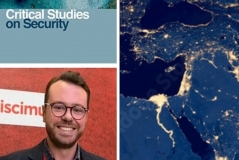
Umut Can Adısönmez's New Article Published in the Journal "Critical Studies on Security"
Faculty member of IUE Political Science and International Relations, Dr. Umut Can Adısönmez and Assoc. Prof. Laçin İdil Öztığ from Yıldız Technical
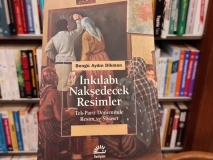
Dr. Bengü Aydın Dikmen's new book "İnkılabı Nakşedecek Resimler" is published!
Bengü Aydın Dikmen focuses on the painting policy during the foundation and construction period of the Republic. In this way, she also
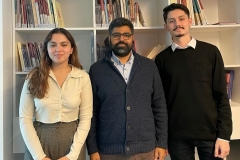
Serhun Al and Umut Can Adısönmez Lectured on Conflict Resolution and Peace Building
Faculty member of IUE Political Science and International Relations, Dr. Serhun Al and Dr. Umut Can Adısönmez, participated as trainers in the

Umut Can Adısönmez participated in the "Human Security and Resilience in South East Europe" Panel
Faculty member of IUE Political Science and International Relations, Dr. Umut Can Adısönmez participated in the panel discussion "Human Security and Resilience
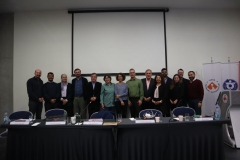
We Organized Our Republican Centennial Symposium
As the IUE Political Science and International Relations Department, we organized a symposium on the Centennial of our republic. In the symposium
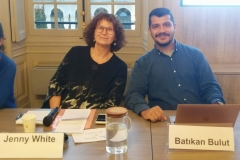
Batıkan Bulut presented his proceeding on the CEST 2023 Paris Symposium
Research assistant of the IUE Department of Political Science and International Relations, Batıkan Bulut presented his paper titled "Civil Society and Competitive



